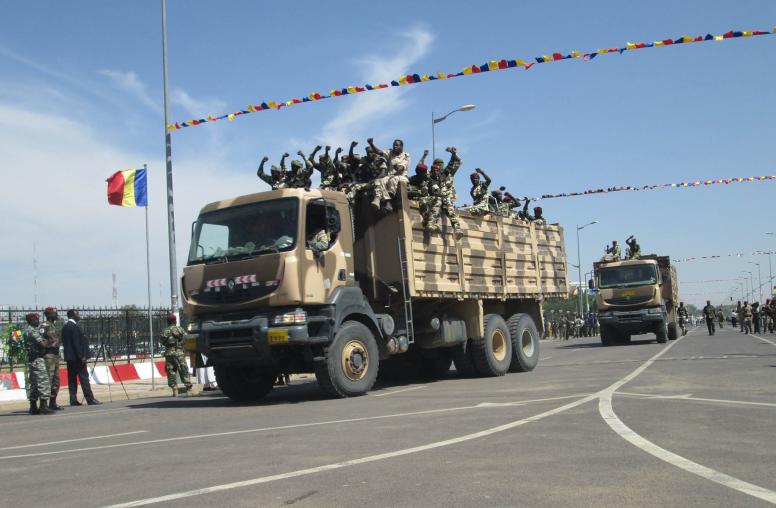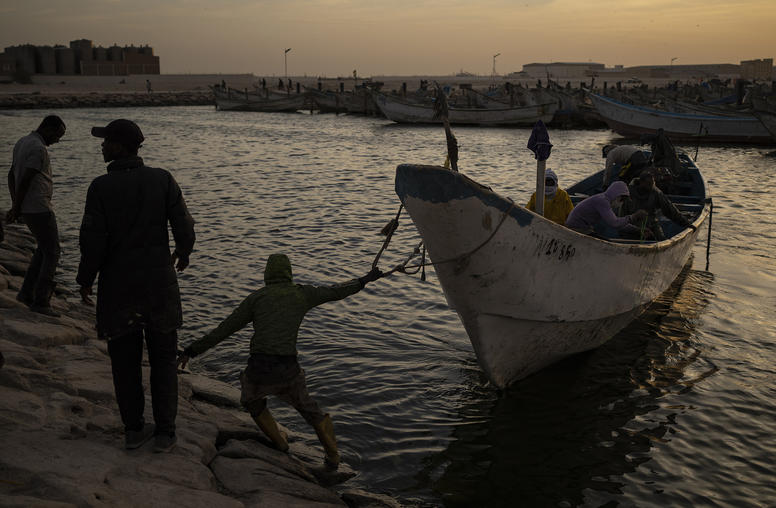Chad, and Darfur, After Bashir
Will Sudan’s western neighbor be the next African country to oust its leader?
The politics of the Central African nation of Chad are closely connected with those of Sudan, most prominently because of Darfur, the vast and troubled Sudanese region which borders Chad to the east. The recent fall of Sudan’s president Omar al-Bashir—in power since 1989—raises questions about the future of Chad’s president and U.S. ally, Idriss Déby, beset by similar governance challenges and in power since 1990. Jérôme Tubiana, co-author of a 2017 USIP report on Chad, and USIP’s Aly Verjee discuss the implications of political change in Sudan for Chad.
![French soldiers patrolling the area around the airport in N’djamena, Chad, after rebels tried to overthrow the president, Idriss Deby, Feb. 9, 2008. (Benedicte Kurzen/The New York Times)]](/sites/default/files/styles/image_with_caption/public/2019-05/20190502-nyt-reportajes_polgreen_chad2_feb22-ac.jpg?itok=xkSDhbH4)
Omar al-Bashir has been replaced by a military government. Will this affect Chad?
Verjee: Sudan is the third of Chad’s neighbors to see a change of political leadership in recent years, after Libya and the Central African Republic (CAR). Further, the leaders of Chad’s neighbors to the west, Niger and Nigeria, have only been in power since 2011 and 2015 respectively. So, it would be surprising if Déby was not thinking about his future, especially given the coup d’état against Bashir, his closest political contemporary. Déby will surely try to learn from Bashir’s failure to survive.
Although in the past their relationship was strained, Bashir and Déby have recently been on good terms. They met in Khartoum to discuss continued cooperation as recently as April 4, only a week before Bashir was deposed. Déby, like many others, is waiting to see what direction Sudan now takes. While Khartoum’s military leadership has no immediate reason to antagonize N’Djamena, the appointment of Mohammed Hamdan Dagolo, also known as Hemmeti, as deputy head of Sudan’s transitional military council (TMC), elevates a militia leader from Darfur to a position of great national influence. Should Hemmeti remain at the fore, the Sudan-Chad relationship will eventually receive more attention.
Tubiana: The Chad-Sudan rapprochement began in 2010 as a non-aggression pact between Déby and Bashir. Whether the TMC will respect the deal in the long term remains to be seen, especially given the history of its leadership—TMC head Abdel Fattah al-Burhan, and his deputy Hemmeti—in the Sudan-Chad borderlands. Between 2003 and 2005, Burhan was a military intelligence colonel coordinating counter-insurgency operations in West Darfur, which included the notorious janjaweed militias. These groups incorporated Chadian rebels and operated inside Chad as well as Sudan.
The ascent of Hemmeti, who hails from a small Chadian Arab clan that settled in South Darfur in the 1980s, may have significant implications for Chad. Hemmeti has played on all sides: first as an influential janjaweed leader in his local area, and later, nationally; for a brief time, as a rebel in opposition to the Sudanese government; and then, as a security advisor to the government of South Darfur, his first official government position.
Throughout his changing roles, Hemmeti maintained strong ties with Chadian Arab politicians, who in 2006 were instrumental in Hemmeti agreeing to a non-aggression pact with the Sudanese rebel Justice and Equality Movement. Now he appears to be more hostile to the Déby regime and may be supportive of an Arab takeover in Chad.
The future role of Hemmeti’s Rapid Support Forces (RSF) in Chadian politics is uncertain. The RSF includes hundreds of Chadian Arab youths and ex-rebels, of whom, reportedly, recruitment continues. Such militants may well be more interested in regime change in Chad than in Sudan. While internally divided, Chadian Arabs have historically been represented in both government and in the opposition, in ethnically mixed political parties. However, some might not refuse Hemmeti’s armed support, if offered, even if this risks an exportation to Chad of Darfur-type Arab versus non-Arab violence, which would be unprecedented for the country.
Already, tribalism and Arab supremacism, influenced by Sudanese and Libyan politics, increasingly affect Chad, with Arab attacks against non-Arab civilians taking place in both eastern Chad and in gold mining areas straddling the Chad-Libya border.
Since 2016, Chad has experienced anti-government protests. Does the success of Sudan's protesters embolden those Chadians in opposition to Déby?
Tubiana: Certainly, it does, although Chad’s civil society has closer models for protest in francophone Africa, notably in Burkina Faso, the Democratic Republic of the Congo, and now in Algeria. There are also important differences with Sudan. Chad has an increasingly active civil society, including some trade unions, but it does not have a strong student movement, nor a large urban middle class. Key to the events in Sudan was the protest of elites from the same communities in Sudan’s central region who comprise the regime and the security forces, which may have caused some in the military to refrain from brutality. In Chad, the security forces are largely comprised of ethnic minority Zaghawa, but not many Zaghawa are represented in civil society and the civilian opposition, and thus do not have the influence to restrain the armed forces.
However, the Zaghawa are well represented within Chad’s armed opposition, particularly in the Union of Forces of Resistance (UFR) led by Timan Erdimi. The Chadian army has often been reluctant to fight the UFR, which may explain why Déby’s government had to rely on the French air force to attack UFR forces who entered northern Chad from Libya in February. The French government justified its intervention on the grounds it was acting to prevent a coup d’état.
The French intervention suggests that Paris remains committed to Déby, even more so than it has been in the past. The U.S. also considers Chad a key ally in the fight against violent extremist groups, and cooperates militarily with Chadian forces, and with the counter-terrorist military effort against Boko Haram, the Multinational Joint Task Force (MNJTF), which is headquartered in N'Djamena. Unfortunately, neither France, nor the U.S., nor others in the international community seem ready for diplomacy leading to a peaceful transition. I wrote in 2017 that “Chad’s international backers should discourage it from repressing dissent and encourage it to negotiate a more inclusive transition.” That message still needs to be conveyed to N’Djamena today.
Verjee: Some Chadian protesters have recently cited the Sudanese protests as inspiration, for example referencing the iconic image of Alaa Salah. But such symbolism is not going to be sufficient to depose Déby. At the same time, ongoing Chadian repression—like in Sudan, the government imposed an extended social media blackout—isn’t going to quell deep-rooted discontent.
How do events in Khartoum affect the politics of Darfur?
Tubiana: Violent repression in Darfur has continued during the current protests. Still, many Darfurians are looking at events in Khartoum both hoping for change while anxious about the implications for their region. They are happy with the solidarity shown by protesters who rejected racist calls from the Bashir regime, as shown in the protest chants of “we are all Darfur,” but remain frustrated that repression in Khartoum seems to matter more than massive violence in Darfur.
For many Darfurians, Hemmeti is no better than Bashir. If he remains in a position of power, as it appears he intends, there will never be confidence that things will truly change in Darfur. Yet there are no simple solutions: Even if a new, civilian-led government in Sudan tries to disarm the janjaweed, it will inevitably push militants to be active across Sudan’s borders, in countries where they have been historically active, including Chad, Libya, and CAR.
Verjee: Long before the first protester died in Khartoum, there were thousands of others who mostly died anonymously, in Darfur and other conflict areas of Sudan. Reportedly, as many, if not more, Darfurians were killed in April protests in towns in Darfur as were protesters killed on the streets of Khartoum.
In mid-2018, the United Nations Security Council authorized a downsizing of the U.N. mission in Darfur, following reports that the level of violence had declined. There is a certain macabre irony to the fact that the U.N. had been handing over its peacekeeping sites to the same government of Sudan—and the same state governors of Darfur—who oversaw Darfur’s repressive security apparatus.
After Bashir fell, the head of the U.N. mission in Darfur told the Security Council that “the political situation in Sudan has changed drastically and could affect implementation of the mission’s mandate going forward.” Although the TMC has extended the government cease-fire in Darfur, it is now appropriate to reassess the U.N. mission’s withdrawal strategy, particularly as the risk of violent repression under a military government remains acute.
Jérôme Tubiana is a researcher who specializes in Chad, Sudan, and South Sudan and co-authored, with Marielle Debos, the 2017 USIP Special Report, “Déby’s Chad: Political Manipulation at Home, Military Intervention Abroad, Challenging Times Ahead.” Aly Verjee is an advisor to the Africa program at USIP.



